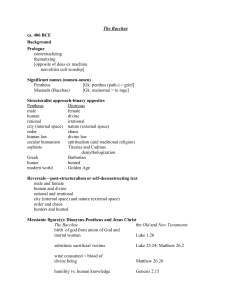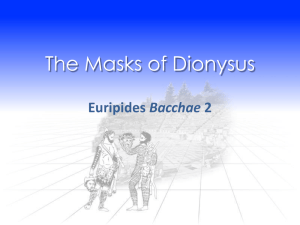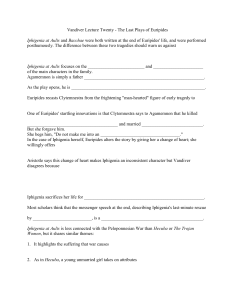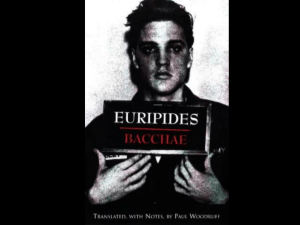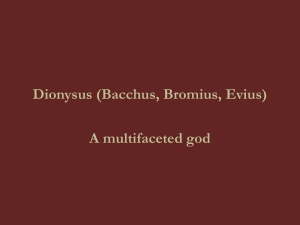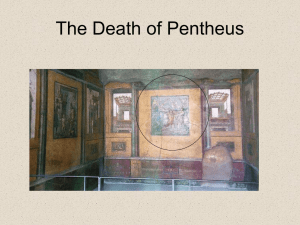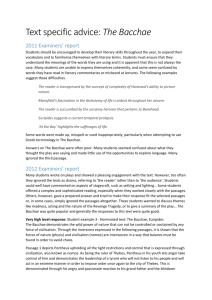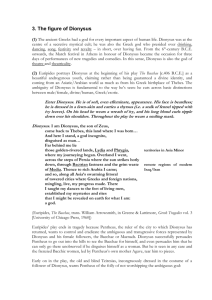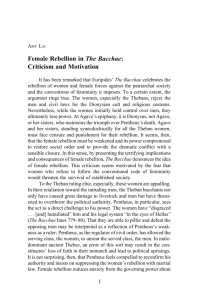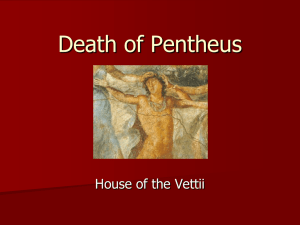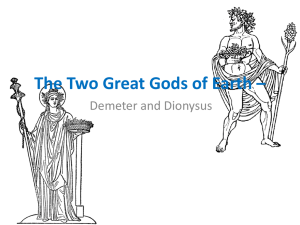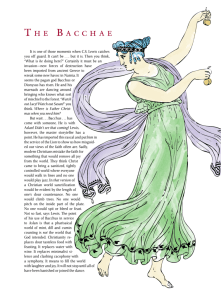Euripides Bacchae 1
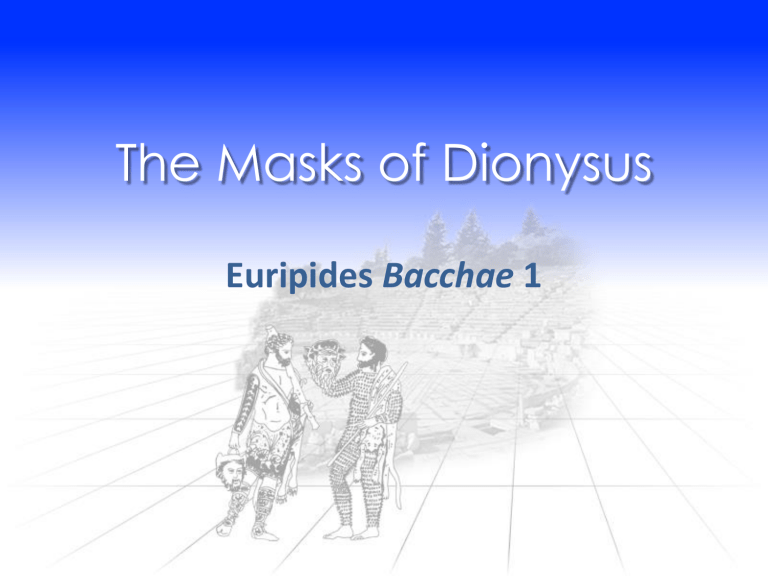
The Masks of Dionysus
Euripides Bacchae 1
“Nothing to do with Dionysus”
(Chamaeleon)
Neo
Matrix Reloaded (2003)
Dionysus/Satyr Mask
(Athenian, 500s BCE)
Agenda
•
Aristotle’s Poetics
•
Tragedy Explained?
•
Bacchae: Background
•
Drama Dramatized?
•
Discussion
•
Advice for Pentheus…
19-Sep-11 Bacchae 1 4
Aristotle’s Poetics
Tragedy Explained? (Euripides’ Bacchae)
Poetics: Approach
Method
•
Definition
•
Classification
•
Aetiology
• origins/causes
•
Critical evaluation
Criteria
•
Organic coherence
•
Plausibility
•
Emotional impact
•
Utility
• pleasure
• therapy
• pedagogy
19-Sep-11 Bacchae 1 6
13-Sep-11
Aristotle’s Uses of Imitation?
please teach purge
Csapo 7
DEFINITION OF TRAGEDY:
“Tragedy, then, is an imitation of an action that is serious, complete, and of a certain magnitude; in language embellished with each kind of artistic ornament, the several kinds being found in separate parts of the play; in the form of action, not of narrative; through pity and fear effecting the proper purgation
(katharsis) of these emotions.” (p. 61)
POETRY VERSUS HISTORY:
“Poetry, therefore, is a more philosophical and a higher thing than history: for poetry tends to express the universal, history the particular.” (p. 68)
PLEASURE OF LEARNING
“... to learn gives the liveliest pleasure, not only to philosophers but to men in general....” (p. 55)
Perfection of Plot (muthos)
Less Good
•
Episodic
•
Simple lacks…
• reversal (peripateia) and/or
• recognition (anagnorisis)
Better
•
Logical, plausible
•
Complex has…
• reversal (peripateia) and/or
• recognition (anagnorisis)
13-Sep-11 Csapo 9
Concepts & Application: Bacchae
concept
ethos “character”
(Pentheus)
hamartia “error”
desis “complication”
lusis “unraveling, solution”
anagnorisis “recognition” peripeteia
“reversal (of fortune)”
catharsis “purification” learning?
pleasure?
Bacchae stock tyrant’s paranoia (creon-like), stubborn.
hubris – arrogant in the face of Dionysus.
19-Sep-11 10 Bacchae 1
Bacchae: Background
Drama Dramatized?
Quotes: Euripides’ Bacchae
“Happy the man whom the gods / Love, and whose secrets he knows” (Chorus, p. 399)
“For whoso leads the revel / He is always Dionysus”
(Chorus, p. 400)
“There is no cure for madness, when the cure itself is mad” (Tiresias, p. 409)
Play Facts, Backstory
•
Production
•
Iphigenia at Aulis
•
Alcmeon
•
Bacchae
• satyr play (which?)
•
Text
•
Characters, Backstory
•
Dionysus, Pentheus
•
Cadmus, Tiresias
•
Agave, sisters
•
Chorus of Bacchants
19-Sep-11 Bacchae 1 13
Zeus = Semele
Dionysus
Cadmus = Harmonia
Ino Echion = Agave
Pentheus
(“Man of Sorrows”)
Autonoë
Actaeon
Dionysus, Dionysianism
Dionysian initiation
•
Cross-dressing
•
Mystic knowing
•
Ritual rebirth
Maenads, maenadism
•
Rapture
•
Thyrsus. . .
•
“. . . and with the fennel, join reverence to riot” (p.
400)
• lit. “Sanctify the hubristic
(hubristas) fennel rods all around!”
•
Sparagmos, Omophagia
•
Oresibasia
19-Sep-11
Maenad/bacchant
Bacchae 1 15
Names
•
Dionysus
•
“Zeus of Nysa?”
•
Bakkhos (“Bacchus”)
•
“He of the cry iō bakkhe”
•
Bromios/Bromius
•
“The Roarer,” Dionysus as bull
19-Sep-11 Bacchae 1 16
thyrsus (fennel rod)
Maenad (mainas “she who is mad”) bacchant (bakkhē)
Io bakkhe! euoi
• prologue (starts p. 395)
•
Dionysus
• parodos (398): “Asian” (Anatolian)
Bacchants. Cult hymn
•
1st episode (402)
•
Tiresias, Cadmus, Pentheus
•
1st stasimon (412)
•
Pentheus’ impiety
•
2nd episode (414)
•
Servant, Pentheus, Dionysus (in disguise)
•
2nd stasimon (417)
•
Thebes’ rejection of Dionysus
•
Choral dialogue (418): Chorus & D
•
Earthquake
•
Trochaic dialogue, D & Leader (420)
•
“messenger” scene
•
3rd episode (422)
•
Short dialogue, D&P
•
Messenger scene: hubris in the hills
Analysis
•
3rd stasimon (431)
•
Hope restored, do not mock the god
•
4th episode (432)
•
D&P. Fitting scene
•
4th stasimon (436)
•
Excited song of vengeance
•
5th episode (438)
•
Messenger (servant on death of
Pentheus)
•
5th stasimon (442)
•
Short song of triumph
• exodos (443)
•
Agave’s mad scene
• lyric dialogue
•
Cadmus’s return with Pentheus
• recognition, reversal
•
Lament for Pentheus
•
Deus ex machina
Discussion
Advice for Pentheus…
19-Sep-11
Journal Prompt
(Agon pp. 414 ff)
Imagine yourself inside Euripides' play.
What would you say to Pentheus? Is he in the right? In the wrong? What would be your advice for handling this problem he's got?
Bacchae 1 20
Advice…
19-Sep-11 Bacchae 1 21
